|
|
|
Sort Order |
|
|
|
Items / Page
|
|
|
|
|
|
|
| Srl | Item |
| 1 |
ID:
092503
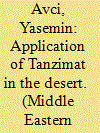

|
|
|
|
|
| Publication |
2009.
|
| Summary/Abstract |
The second half of the nineteenth century was a period when the Ottoman government's centralization efforts gained momentum. In Southern Palestine, this entailed a struggle for central government to gain the upper hand over the Bedouin tribes. In the 1860s, the Ottoman government was still using military power to end the internal strife between the Bedouin tribes. However, from the 1890s on, the government began to use sophisticated means and tactics in order to secure control and encourage the integration of the Bedouin element in the empire. The creation of a new town, namely Beersheba, the changing apparatus of administration, the construction of public buildings in desert, all meant that the government attempted to penetrate the nomad's way of life. In this study the main emphasis will be given to describing the role of the state in forming and changing the tribal institutions.
|
|
|
|
|
|
|
|
|
|
|
|
|
|
|
|
| 2 |
ID:
154063
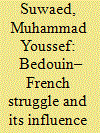

|
|
|
|
|
| Summary/Abstract |
The post-World War I partitioning of the Ottoman Empire, especially the League of Nations’ appointment of Britain and France as the mandatory powers for Palestine and Syria respectively, influenced the lives of the inhabitants of Upper Galilee. With the district left in December 1919 under French rule, the elated Christians began to avenge themselves on their long-time Bedouin opponents, who for their part supported the short-lived pan-Arab kingdom proclaimed in Damascus by Emir Faisal ibn Hussein of Mecca. With the Upper Galilee deteriorating into internecine strife, the Jews, perceived as supporters of the French, became a target for Bedouin attacks.
|
|
|
|
|
|
|
|
|
|
|
|
|
|
|
|
| 3 |
ID:
142756
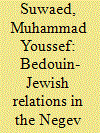

|
|
|
|
|
| Summary/Abstract |
On the foundation of the first Jewish settlements in the Negev, at the start of the 1940s, the Bedouins welcomed the Jewish settlers. The local personal connections and mutual acquaintance between them created a feeling of closeness. The symbiosis of daily life and mutual help in the fields of personal needs, from medicine to transport, replaced their mutual fears.
However, two factors quickly changed this attitude. The first was a severe drought, which struck the Negev in the winter of 1947, and brought with it a difficult economic situation, followed by several robberies and disputes, and damage to property. The second factor was the incessant encouragement given by the leaders of the Palestinian National Movement to the Bedouins to join the struggle against the Jewish population, especially after the UN decision in November 1947, that is, after the partition of Palestine and the inclusion of the Negev within the borders of the Jewish state.
Most of the Bedouins joined the Palestinian National Struggle. Friends of yesterday became today's enemies. The years 1947–1949 were a period of anarchy, which continued well into the 1950s. In this period the State of Israel was established. Consequently, the Jewish population in the Negev was no longer the party responsible for the relationship with the Bedouins, as the Israeli government took its place. Also contact between neighbors was reduced after the Bedouins were evacuated toward the ‘fence’ region, in the Beer-Sheva Valley. The freedom the Bedouins enjoyed before the war did not exist anymore.
|
|
|
|
|
|
|
|
|
|
|
|
|
|
|
|
| 4 |
ID:
151857
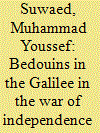

|
|
|
|
|
| Summary/Abstract |
The relations of the Bedouins with the Jewish population during the War of Independence were very complex. The Bedouins were both opponents and friends. Bedouin groups helped the Jews in their struggle against the Palestinian national movement and against the Arab armies like Arab-al-Hib. Before the foundation of the state, these Bedouins had already participated in the protection of the security of the Jewish population. They supplied intelligence on events of the Arab and Palestinian sides, and also fought by the side of the Jews in the War of Independence, but at that time other groups joined the Palestinian national movement and took part in the struggle against the Jewish population, more so after the declaration of the partition plan in the United Nations. Subsequently, Bedouin fighting gangs were established and they joined the Palestinian struggle with the Jewish population.
|
|
|
|
|
|
|
|
|
|
|
|
|
|
|
|
| 5 |
ID:
193990


|
|
|
|
|
| Summary/Abstract |
Akil Agha al-Hasi, a son of a Bedouin family, immigrated into Palestine from Egypt at the start of the 19th century. He was a dominant factor in the history of Galilee from the 1830s to the end of 1860s. His official job was commander of irregular soldiers in the service of the Ottoman governor, although in fact, his job and his status exceeded much, a job in the service of the authorities. Akil Agha knew how to take advantage of the power bases which stood at his disposal: units of irregular soldiers, alliances with Bedouin tribes, villages and townsmen, and the weakness of the Ottoman government in general, and in the region, in particular, in order to become a center of power, indeed a local one, but also worrying at a national level. Sometimes he would overcome this attempt and sometimes he failed, and then he would run rampage against order and security in order to force the authorities to understand that only he was the key to order and security in the region. For the lack of an alternative, they were forced to return him to his job, but not for a long time, and he was again dismissed.
|
|
|
|
|
|
|
|
|
|
|
|
|
|
|
|
| 6 |
ID:
171051
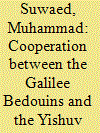

|
|
|
|
|
| Summary/Abstract |
During Israel’s War for Independence, the Bedouin tribes did not have a united attitude: Some tribes, who built good relations with the Jewish population, supported the Jewish side and fought with them, whereas other Bedouins tribes considered themselves part of the Palestinian population and fought with them. There were also tribes that supported no side and kept neutral.This article focuses on the Galilee Bedouin tribes, who chose to cooperate with the Jewish Yishuv and fought on their side. The article explains the background on which the relations between the Bedouins and the Jews in Galilee were built at the end of the Ottoman era and during the British mandate. It also examines the mutual trust and friendship that had developed between the Jewish population and their neighbor Bedouin tribes, leading them to cooperate with the Jewish side and support their cause. It analyzes causal factors and historical events that led certain Bedouin tribes to fight against the Jews and support the Palestinian side, and the reasons tribes kept neutral in this conflict.
|
|
|
|
|
|
|
|
|
|
|
|
|
|
|
|
| 7 |
ID:
189421
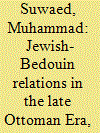

|
|
|
|
|
| Summary/Abstract |
The complex relationship between Bedouins and Zionist pioneers in the Land of Israel during the late 19th and early 20th centuries evolved along two parallel tracks: conflict and cooperation. The former was a corollary of the sociocultural gap between the pioneers and the Bedouins and revolved by and large around the diametrically opposed views regarding land ownership rights and their implications (e.g. access to water, grazing). The latter was a result of the growing Bedouin realisation that the Zionist project was there to stay: the more the Jewish pioneers proved their determination to cultivate their lands and defend themselves the more they won Bedouin respect, or at least grudging acquiescence, which in turn evolved to wider recognition of the vast socioeconomic benefits of peaceful coexistence.
|
|
|
|
|
|
|
|
|
|
|
|
|
|
|
|
| 8 |
ID:
189422
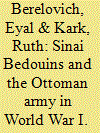

|
|
|
|
|
| Summary/Abstract |
Though forming having taken an active part in the Sinai and Palestine campaigns of the World War I, the Bedouin tribes are rarely mentioned. This is due in part to the scarcity of documentation, especially having none from the Bedouins themselves. This article seeks to fill in some of the gaps in the research on the war in the Sinai Peninsula and southern Palestine, and to examine the contribution of the Bedouin tribes in that area to the Ottoman military campaign. It argues that the Ottoman perception of the Bedouins as a fighting force changed during the war from being seen as force multiplier to being employed only in scout and reconnaissance roles.
|
|
|
|
|
|
|
|
|
|
|
|
|
|
|
|
|
|
|
|
|